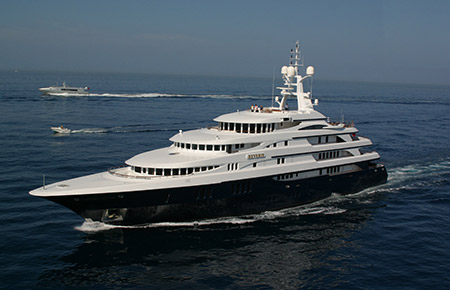18 March 2021
Whilst staying safe should always start onboard, the actions taken by a Designated Person Ashore (DPA) could prove the difference between life and death in a serious emergency.
What is a Designated Person Ashore?
The Designated Person Ashore (DPA) plays an instrumental role in delivering the safety management systems adopted on board a vessel by a yacht or shipping company.
According to the ISM Code, the DPA is responsible for ensuring company employees who support a vessel's operations always embrace the right attitude and behaviour towards safety.
To safeguard the welfare of anyone working on a vessel, it is essential for The Designated Person Ashore to promote and support a positive approach to safety and environmental protection.
On a day to day basis, the DPA must ensure a vessel is safely operated, acting as a reliable direct connection to the shipping company’s highest level of management for the onboard crew.
To comply with the ISM Code, a DPA must:
What vessels need an (ISM) Designated Person Ashore?
Every commercial vessel over 500gt is required to have a DPA under the ISM Code.
The shipping company MUST provide documentary evidence which proves the DPA has received sufficient training to undertake their duties.
Failure to do so means the company will NOT be compliant with the ISM Code.
At WYM Group, we take the stress and strain out of vessel ownership by providing a comprehensive DPA service.
We currently offer this provision for a wide range of yachts, superyachts, cargo ships and commercial vessels – including 7000gt passenger ships.
What does a Designated Person Ashore do?
The DPA must NOT be used as the main point of contact for routine complaints.
They SHOULD be alerted if help is required to resolve a safety-critical situation or for any other urgent safety issues.
As outlined in the ISM Code, the DPA’s 3 main responsibilities are to:
Why is a Designated Person Ashore so important?
Every vessel is issued with a unique Safety Management Manual (SMM), giving detailed instructions about how it should be operated safely and efficiently.
To minimise the risk of incident or injury, the DPA should ensure the requirements laid out in the SMM are being followed onboard at all times.
Should an incident occur, the DPA should be contacted as quickly as possible so they can notify any relevant organisations, such as the company’s insurance or Flag Administration.
If a serious safety issue arises, the role of a DPA often comes under scrutiny from the owner, crew, management company, Coast Guard and Marine Board of Investigation.
Appointing a Designated Person Ashore you can trust
At WYM Group, we appreciate the vital role the DPA plays in implementing an effective onboard Safety Management System.
Our current register of fully-qualified DPAs includes two former Master Mariners and an ex-passenger ship surveyor.
Prioritise safety, enlist our help and we can provide a DPA who will:
At WYM Group, we’re proud to provide the personal touch. Our DPAs visit vessels frequently so they can meet the people who maintain and operate them.
We do this because it helps to build long-lasting relationships. It also improves trust and confidence, vital assets should the worst ever happen and an emergency arise.
If this safety-first approach sounds like the support you need, please don’t hesitate to get in touch – our experts will be happy to help!

WYM Group have been managing our 200ft yacht since 2018 and we are totally satisfied with their services. They have a wealth of experience and are always efficient and diligent in all our dealings.
Scott, Owner's Representative
The complex aspects of managing any large yacht are no mean feat, but Allan and his team are always there to assist when needed. They handle everything with drive and knowledge, building the perfect environment for the owner and Captain to develop confidence and trust.
Oscar, Master Mariner
Thank you for your excellent service with the management of our client's 60 metre Feadship - we are pleased with how seamlessly you've done what we need.
Steve, Family Office Representative